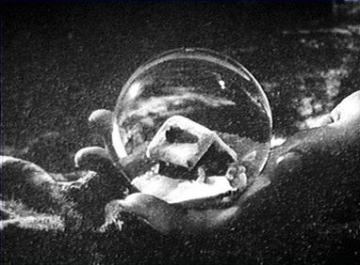
Rosebud is the emblem of the security, hope and innocence of childhood, which a man can spend his life seeking to regain. It is the green light at the end of Gatsby's pier; the leopard atop Kilimanjaro, seeking nobody knows what; the bone tossed into the air in ``2001.'' It is that yearning after transience that adults learn to suppress. ``Maybe Rosebud was something he couldn't get, or something he lost,'' says Thompson, the reporter assigned to the puzzle of Kane's dying word. ``Anyway, it wouldn't have explained anything.'' True, it explains nothing, but it is remarkably satisfactory as a demonstration that nothing can be explained ...
``Citizen Kane'' knows the sled is not the answer. It explains what Rosebud is, but not what Rosebud means. The film's construction shows how our lives, after we are gone, survive only in the memories of others, and those memories butt up against the walls we erect and the roles we play. There is the Kane who made shadow figures with his fingers, and the Kane who hated the traction trust; the Kane who chose his mistress over his marriage and political career, the Kane who entertained millions, the Kane who died alone.
There is a master image in ``Citizen Kane'' you might easily miss. The tycoon has overextended himself and is losing control of his empire. After he signs the papers of his surrender, he turns and walks into the back of the shot. Deep focus allows Welles to play a trick of perspective. Behind Kane on the wall is a window that seems to be of average size. But as he walks toward it, we see it is further away and much higher than we thought. Eventually he stands beneath its lower sill, shrunken and diminished. Then as he walks toward us, his stature grows again. A man always seems the same size to himself, because he does not stand where we stand to look at him.
No comments:
Post a Comment